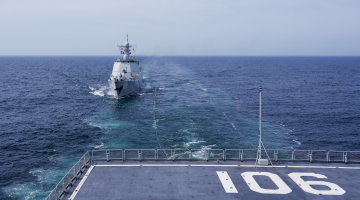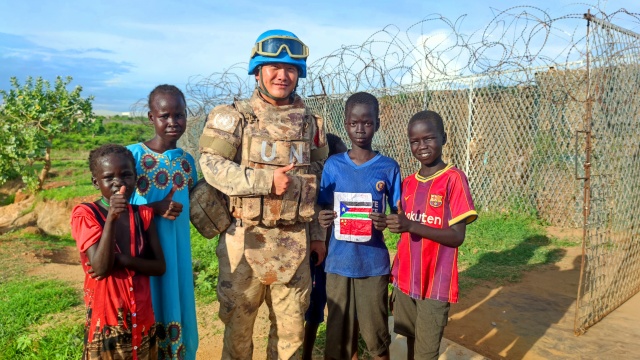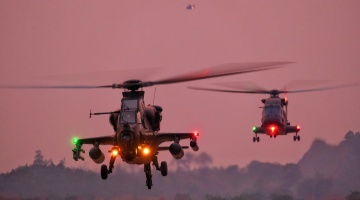By Wang Fudong and Sun Yilong
ROK President Yoon Suk-yeol and his large political and business delegations began a seven-day state visit to the US on April 24. On the occasion of the 70th anniversary of the US-ROK alliance, the two sides decided to take the leaders' summit meeting as an opportunity to further build "global comprehensive strategic alliance" relations. They had endorsed independent cooperation documents for six fields including extended deterrence mechanism, core technologies, cyber security and aerospace, along with more than 50 cooperative memorandums of understanding (MoU). The US-ROK summit released a number of signals that reflect their bloc confrontation acceleration moves, which will bring about new challenges to the situation of Korean Peninsula and Northeast Asia.
Escalation of extended deterrence mechanism is a key topic of this summit. The US and ROK jointly announced the Washington Declaration and decided to establish a new "Nuclear Consultative Group" to share nuclear and strategic weapon operation plans against threats of Democratic People's Republic of Korea (DPRK), negotiate nuclear and strategic planning through regular meetings, and carry out desktop dry run for nuclear crisis management and other activities.
The US and ROK had held frequent joint military exercises and stepped-up pressure on the DPRK recently. This escalation of extended deterrence will further deteriorate the security situation of the latter and intensify the nuclear crisis in this country. Kim Yo Jong, vice department director of the Central Committee of the Workers' Party of Korea, excoriated the Washington Declaration and proclaimed that the DPRK will escalate nuclear warfare deterrence on April 28. It has been made distinct that the US intends to take advantage of DPRK nuclear crisis to inflame tensions in Northeast Asia, strengthen military deployment in this peninsula and tie up the ROK.
It's worth noting that the US-ROK Leaders' Joint Statement stresses opposing "economic coercion" and use of "opaque tools" toward foreign enterprises. The two sides will also build stable and elastic supply chains in coordination with other countries, deepen cooperation in overseas investment audit and export control, and promote progress of the so-called Indo-pacific Economic Framework (IPEF), which clearly echo the US policy orientation of "decoupling" from China.
The trilateral cooperation among the US, Japan and ROK as well as cooperation around "Indo-Pacific Strategy" is emphasized, clamoring bloc confrontation. This joint statement first makes "Indo-Pacific Strategy" an independent chapter, signifying that "targeting China" has become a key part of US-ROK bilateral cooperation. The two countries announced to continue the momentum of improving Japan-ROK relations and strengthen trilateral cooperation among the US, Japan and ROK.
The ROK almost copied the false narrative of "democracy versus authoritarianism" fabricated and bloated by the US. It also follows the latter to intervene in China's internal affairs as to Taiwan Strait and South China Sea issues and other aspects, which had triggered solemn representations from the Chinese Ministry of Foreign Affairs.
It can be seen from the above that the US-ROK summit evidently manifests the traits of ganging up allies and manipulating bloc confrontation. In comparison with the vision of a community with a shared future for mankind characterized by win-win cooperation and inclusiveness that is advocated by China, it is easy to tell which is superior. The former aims to further aggravate regional tension and confrontation, which will heavily impact nuclear issue on the Korean Peninsula, China-ROK relations and Russia-ROK relations. Many people in the ROK were concerned that such aggressive diplomatic actions will leave their country diplomatically isolated, even more, as a beneficiary of post-cold war era, the country would suffer from huge economic and geographical interest losses once a new cold war mentality is activated.
Recently, the favor of Yoon Suk-yeol administration had even declined below 30% owing to diplomatic imbalance, mismanagement of domestic affairs and other reasons. Therefore, the government expects to achieve a reversal of public opinion and consolidate the foundation of governance through this high-profile summit. However, though the lineup was grand, the ROK leader's visit mostly acted in rhythm with the US "Indo-Pacific Strategy" without substantive gains for itself. It can be said that there is a prevalence of superficiality over substance and risks over benefits.
(The author is from Institute of International Economics and Politics, Shandong Academy of Social Sciences.)
Editor's Note: Originally published on china.com.cn, this article is translated from Chinese into English and edited by the China Military Online. The information and opinions in this article do not necessarily reflect the views of eng.chinamil.com.cn.









